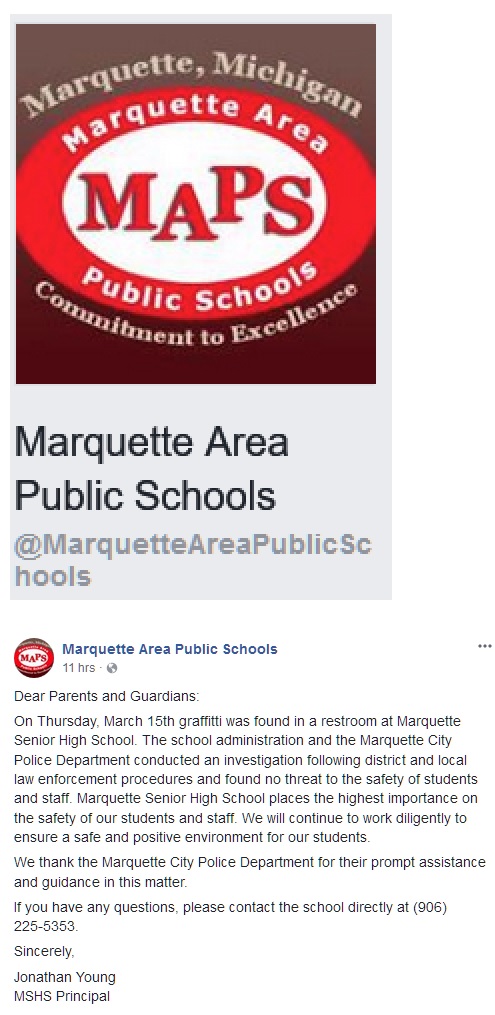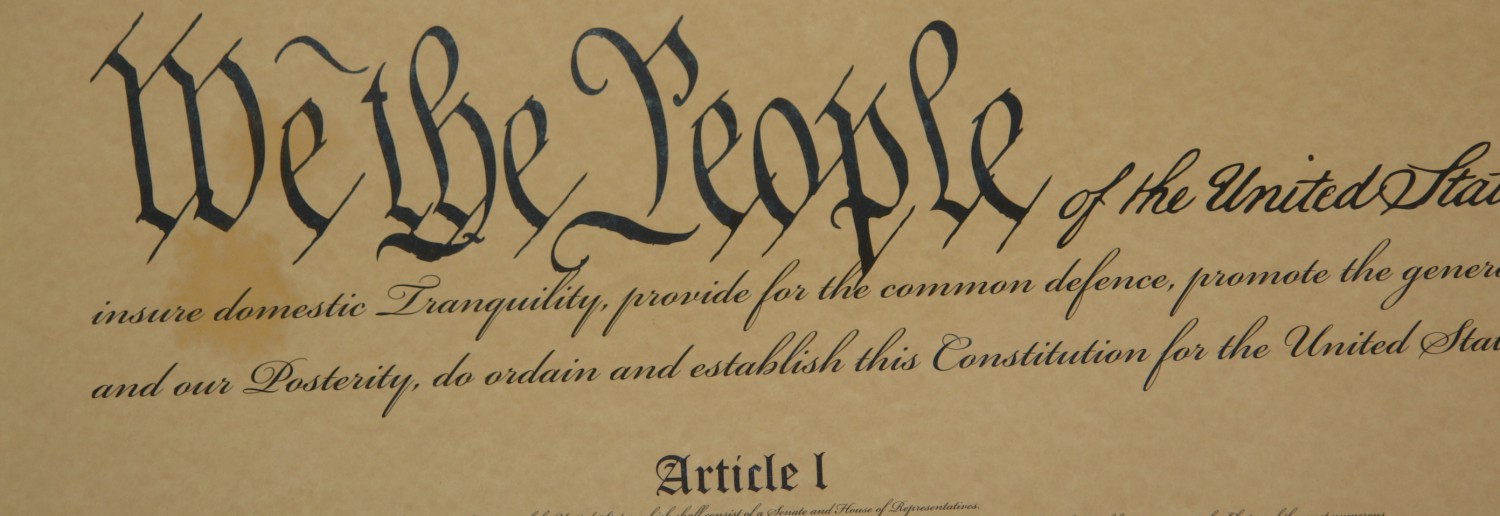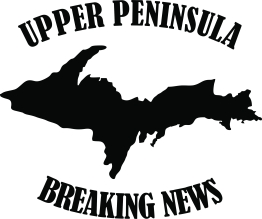URGENT U.P. Breaking News Bulletin – 3-16-18 – 4:44 a.m. ET –
U.P. school officials continue to investigate threats with the latest at Negaunee High School – Negaunee school officials sent Thursday night message to parents

At least seven U.P. school districts probe threats since the Feb. 14th mass shooting at a high school in Parkland, Florida – with the latest alleged threat in Negaunee, MI
By Greg Peterson
U.P. Breaking News
Owner, News Director
906-273-2433
(Negaunee, MI) – Negaunee High School will have classes as normal today, after school officials tell parents the latest threat is not credible
A rash of U.P. school shooting/bombing threats this week have keep police and school officials busy this week – with the latest triggering a statement Thursday night to parents by the Negaunee Public Schools superintendent.
Negaunee Public Schools Superintendent Dan Skewis said in a message to parents that a threat to student safety is not credible – following at least one threat to shoot up the high school.
An outbreak of threats has happened across the U.P. school districts since the Valentine’s Day mass shooting at the Marjory Stoneman Douglas High School in Parkland, Florida. The threats at high schools in at least 7 U.P. districts have mostly been debunked but in some cases validated.
One students from Escanaba is facing criminal charges, while charges are expected to be filed against a female student who made bomb threats in Munising.
Negaunee High School will be open this morning – and school officials say students will be safe in their classes.
Numerous parents contacted U.P. Breaking News upset that the district was not more forthright with information – because the lack of official information causes confusion.
In fact, it was obvious that rumors were spreading fast Thursday night, as parents are worried that one of these times it will not be a hoax. School officials have not released anything about the nature of the threat or threats.
The district did not issue a public news release or post anything on its social media pages (as of 4:45 a.m. Friday). In fact, it seems many U.P. school officials release as little as possible about the incidents, and only make public statements when the information leaks.
Several parents said the threat was made by a female sophomore (we are withholding her name). The sophomore reportedly made statements to other students, and district officials found out about the comments
Negaunee school officials said in a message to parents the threat is not credible.
A text was sent out Thursday night by the Negaunee Schools Superintendent about rumors “circulating” about a “potential threat to student safety tomorrow at school.”
The district stated its personnel and police had spent “several hours” investigating the allegations.
“We are concluding there is not a credible threat – again – there is not a credible threat to student safety,” the statement said. “School will be in session as normal” on Friday (today).
“We appreciate the calls” from the public “and (for) any tips that were provided – thank you and have a nice night,” states the Negaunee message to parents.
https://negaunee.k12.mi.us/district/ok-2-say
Numerous other U.P. school districts also dealt with threats and hoaxes this weekend and in the past few weeks:

Officials at Marquette Senior High School issued a statement on Thursday (above) after graffiti was found on a bathroom wall. The statement was from MSHS Principal Jonathon Young.
Police were called, and officials ruled there was “no threat” to student safety. Some form of a school lock down was put in place during the investigation.
 Meanwhile in Escanaba, a credible threat at the high school caused a student to be taken into custody on Wednesday.
Meanwhile in Escanaba, a credible threat at the high school caused a student to be taken into custody on Wednesday.
The student was taken to the (MDHHS) Bay Pines Center for U.P. juveniles accused of crimes. The student also received a mental health assessment.
The student allegedly made a verbal threat to student safety during a conversion with others.

At Westwood High School this week, a threat to shoot up the school appeared in several bathrooms. School officials said they believe it was not written by one of its students. NICE Community School officials told parents they believe it was written by someone from outside the area during a recent athletic event held at Westwood.
In Munising on Tuesday, March 14, 2018, a female student admitted making written bomb threats in two bathrooms.
The case against the suspended female student has been referred to the Alger County Prosecutor’s Office.
A few weeks ago immediately after the slaughter at a Florida school, threats were also investigated at the Soo High School and at the Rudyard schools.
On a brighter note, hundreds of U.P. students participated in this week’s national protest against school shootings and urging a wide-range of measurable action to prevent future shootings in American schools. The U.P. has yet to fall victim to the epidemic of U.S. school massacres in past decade.

https://negaunee.k12.mi.us/district/administration
MDHHS – Bay Pines Center – State of Michigan



